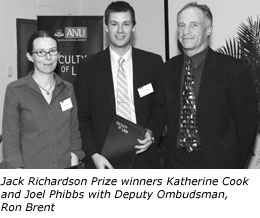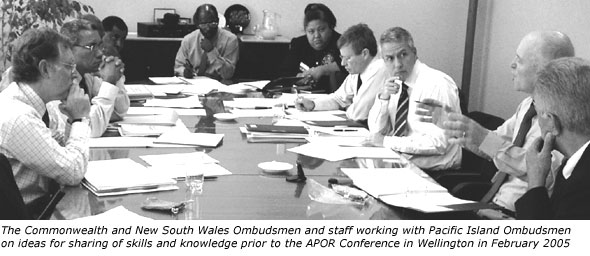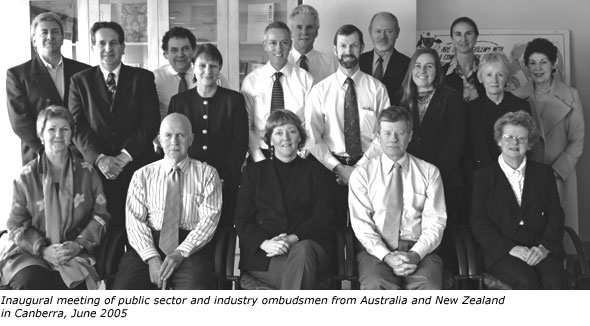Commonwealth Ombudsman Annual Report 2004-05 | Chapter 1


CHAPTER 1 | year in review
Introduction
The core activity of the Ombudsman's office is to handle complaints and inquiries from members of the public about government administrative action. The immediate concern of the office is to assist people in resolving their complaints. In doing so, the office is committed to fostering good public administration that is accountable, lawful, fair, transparent and responsive. This objective is captured in the office's Portfolio Budget Statement outcome—to achieve equitable outcomes for complaints from the public and foster improved and fair administration by Australian Government agencies.
During 2004–05, the Ombudsman and staff investigated complaints made about 105
Australian Government departments and agencies. The complaints ranged across the spectrum of government activity. Remedies and assistance were provided to thousands of people around the country. Submissions were also made by the office to parliamentary and government inquiries, to contribute
to the improvement of Australian Government administration.
Building on the experience and insights gained from handling complaints, the Ombudsman has been able to stimulate improvements across the breadth of government administration. Among the areas beneficially improved are the quality of decision making, internal complaint handling, transparency, record keeping, communication with the public, and sensitivity to individual needs.
'Remedies and assistance were provided to thousands of people around the country.'
A constant challenge for the office is to maintain a high public profile and for the public to know they can turn to the office when problems with government arise. An important step towards meeting this challenge was the development of an enhanced outreach program to rural and regional Australia. Raising public awareness is a vital aspect of our work, and visibility is a key component of our relationship with the public. The office's outreach program signifies the continuing commitment of the office to be active in the community in dealing with problems that people encounter with government.
Complaint Workload
During 2004–05, the Ombudsman received a total of 17,310 complaints, compared to 17,496 in the previous year. The pattern of complaints was similar to the pattern in the previous year, with a decrease in complaints about the Australian Taxation Office (ATO), the Australian Federal Police (AFP) and Centrelink, and an increase in the number of complaints about Australia Post, the Child Support Agency and the Department of Employment and Workplace Relations.
The decrease in total complaints received in both 2004–05 and 2003–04 is against the trend of the previous few years, during which the number of complaints to the Ombudsman was fairly stable. There has, however, been a steady increase in the number of more complex matters brought to the office and in complaints that alleged systemic problems in public administration (see agency-specific sections on pages 25 to 65). There was an increase of 33% in the number of other approaches to the office, such as out of jurisdiction matters and requests for information (see page 17 in 'Performance' section of report).
This year, the Ombudsman investigated 33% (6,198 issues) of all complaint issues finalised, compared to 30% last year. Of those complaint issues investigated by the office, agency error or deficiency was identified in 14% (compared to 20% last year), while there was no error or deficiency identified in 43% (the same as last year). In the remaining 43% of cases the matter was resolved without need to determine whether there was a deficiency.
Public administration
An important role of the Ombudsman is to foster good public administration. A principal way of doing this is to make suggestions and recommendations to agencies, to initiate and conduct own motion investigations to help foster improvements in systemic issues, and to make submissions to government and parliamentary inquiries.
Through its complaint handling and investigative work, the Ombudsman's office comes into contact over time with most aspects of Australian government. We see it as a distinct role of the Ombudsman—as stated in our Strategic Plan—to 'contribute to public discussion on administrative law and public administration' and to 'foster good public administration that is accountable, lawful, fair, transparent and responsive'.
'An important role of the Ombudsman is to foster good public administration.'
The Ombudsman published reports on seven own motion and major investigations. Two of the investigations (which related to the Tax Agents' Board of NSW and the Australian Taxation Office) were completed and provided to the agency in 2003–04, and were reported in last year's annual report. Of the five own motion and major investigations finalised and released publicly in 2004–05, two related to the Australian Defence Force, two to the Department of Immigration and Multicultural and Indigenous Affairs (DIMIA), and one to the Australian Crime Commission.
Reports are nearing completion on two own motion investigations concluded during 2004–05. One investigation looked at administrative matters relating to the Department of Defence's dealings with young people: a draft report was provided to the Chief of the Defence Force in June 2005 for comment. The other is looking at the quality of freedom of information processing by Australian Government agencies. To the extent possible, the Ombudsman's reports on own motion investigations are published in full or in an abridged version on our website at www.ombudsman.gov.au.
Under powers conferred by the Complaints (Australian Federal Police) Act 1981 (Complaints Act), Ombudsman staff worked on four special investigations relating to the AFP. Two of those investigations are still underway and will be completed in 2005–06.
During the year, the Ombudsman commenced own motion investigations into the policy underpinning the administration of marriage-like relationships under the social security law and into DIMIA's administration of visa cancellations under s 501 of the Migration Act 1958 in relation to long-term Australian residents.
The Ombudsman made submissions to, or commented on, a range of administrative practice matters and legislative proposals during the year. One such submission was to the Department of Finance and Administration review on the Compensation for Detriment Caused by Defective Administration Scheme. As required by the Crimes Act 1914, the Ombudsman also appeared before the Parliamentary Joint Committee on the Australian Crime Commission to report on the Ombudsman's oversight of controlled operations by the commission.
 Jack Richardson prize
Jack Richardson prize
To mark the twenty-fifth anniversary of the establishment of the Ombudsman's office, in July 2002 the Ombudsman endowed the Australian National University for the provision of an annual prize for the best essay by an undergraduate in Administrative Law. The prize has been established as the Jack Richardson Prize in Administrative Law in recognition of the contributions made by the first Commonwealth Ombudsman, who was also a former Professor of Law at the ANU. This year's Jack Richardson Prize was awarded to Katherine Cook and Joel Phibbs.
Developing role of the Ombudsman
The Ombudsman's office, though well established, is part of a system of government that is undergoing constant change. Some of those changes impact on the work of the Ombudsman, requiring the office to reflect on its role in government. Several aspects of change arose in 2004–05.
Review of Commonwealth Ombudsman legislation
A review of the legislation establishing the office of the Commonwealth Ombudsman commenced in 2003–04 and continued during 2004–05. The review aims to improve and modernise the legislative framework, with a view to putting proposals to government for the enactment of a new Ombudsman Act.
It is not proposed to change the role of the Ombudsman. Two specific issues being addressed in the review are, first, to extend the jurisdiction of the Ombudsman, in line with an earlier government announcement, to cover the actions of certain Australian Government contractors; and, second, to bring the AFP jurisdiction under the Ombudsman Act, with provisions to take account of special issues that arise in external oversight and accountability of police actions.
New immigration function
In June 2005, Parliament enacted amendments to the Migration Act 1958. These changes give the Ombudsman a statutory role in reviewing the cases of detainees who have been held in immigration detention for more than two years (cumulative), with follow-up reviews every six months if the person remains in detention. This statutory monitoring role will substantially enhance our capacity to oversight the administration of important and sensitive legislation that can have a major impact on people's lives.
Shortly after the end of the reporting year, in July 2005, a report from an independent inquiry conducted by Mr Mick Palmer into the immigration detention of Ms Cornelia Rau was followed by an intense public and political focus on immigration issues. Arising from this report, the government proposed enhancing the role of the Commonwealth Ombudsman in immigration matters by designating the office as the Immigration Ombudsman and providing additional funding. The development of these new functions will be reported on in our 2005–06 annual report.
Postal Industry Ombudsman
Legislation to create a separate office of Postal Industry Ombudsman (PIO) was introduced into Parliament in August 2004. Under the proposed legislation, the Commonwealth Ombudsman will undertake the role of PIO. The jurisdiction of the PIO will extend to private sector postal operators who register to participate in the scheme. The PIO will have the normal powers of an ombudsman to require information or documents and to publish findings. The PIO will be required to observe procedural fairness in investigations.
It is anticipated that Parliament will further debate the Bill during 2005–06. Pending enactment of the legislation, we have been working on establishing a framework of operations for the Postal Industry Ombudsman scheme.
Norfolk Island Ombudsman
In December 2003, a Joint Standing Committee report on Norfolk Island governance proposed that Norfolk Island should establish an office of Ombudsman. It was proposed that the Commonwealth Ombudsman take on the role, under an arrangement similar to that with the Australian Capital Territory Government. To explore the committee's recommendation, the Ombudsman visited Norfolk Island early in 2004 and held discussions with the Legislative Assembly, officers of the Executive Government, and the Administrator. A further visit by a representative of the Ombudsman was undertaken in late 2004, to discuss the arrangements that could be made for handling complaints from Norfolk Island residents.
International cooperation
Over the past four years, the Ombudsman's office has been steadily increasing its international program. In 2004–05, funding from various Australian Agency for International Development programs supported our international activities to facilitate the exchange of specialist advice, training, technical assistance and support to the National Ombudsman Commission of Indonesia, the Thailand Ombudsman, and the Ombudsmen in the Cook Islands, Fiji, Papua New Guinea, Samoa, Solomon Islands, Tonga and Vanuatu.
These activities have confirmed that the Office of the Commonwealth Ombudsman is well placed to play a key supporting role in the development and enhancement of ombudsman offices throughout the Asia-Pacific region.

Key activities for 2004–05
- We finalised 17,441 complaints and 18,939 complaint issues, and handled 12,013 other approaches.
- We completed five own motion and major investigations, with all Ombudsman recommendations being accepted by agencies.
- The Australian Government allocated increased funding in the 2004–05 budget for the Ombudsman to handle complaints arising under the new Free Trade Agreement with the United States of America and to provide the office with secure access to Fedlink.
- We completed a comprehensive review of the office's complaints management system and internal work practices. Improvements are to be initiated in the coming year to achieve better integrated and streamlined work practices.
- The office's internal complaint investigation guidelines were restructured and adapted for online use.
- We conducted two five-day Integrity Investigation Programs jointly with the AFP in May and June 2005.
- We co-sponsored a three-year study, entitled 'Whistling while they work', on whistleblowing protection laws across Australia.
- Ombudsman staff and representatives from a number of other agencies, and AusAID sponsored participants, attended the office's five-day Introductory Investigation Training Course in September 2004.
- We conducted 65 outreach activities, which together covered all States and Territories.
- The office hosted several senior-level delegations from foreign offices, including from China, Indonesia, Korea, the Republic of Maldives and the United Kingdom.
- We replaced the office's ageing desktop equipment.
- We hosted the first meeting of nearly all public sector and industry ombudsmen from Australia and New Zealand, with 17 participants.
- The Ombudsman and staff delivered over 30 papers and presentations at conferences and seminars held around Australia.

The office faced major challenges, some of a continuing nature.
- The small total number of staff in the office (102 full-time equivalent) is spread over eight separate offices, with as few as one staff member in two offices; maintaining an effective national office structure that integrates the work of all staff is a key plank in the Strategic Plan.
- The office has increased markedly in size and functions over the past two years; responding to this growth, while maintaining the traditions and stability of the office, is important.
- The office strives to balance the urgent and immediate pressures of resolving individual complaints with the broader gains achievable by careful targeting of major and systemic issues in own motion and major investigations.
- The continued pressure on staff, particularly from the volume of more complex complaint issues, has had to be addressed through a review of work practices and quality control.
Outlook for 2005–06
In the coming year, the Ombudsman aims to:
- establish a Public Contact Team in Canberra to receive and assess all telephone approaches to the office to enhance performance and consistency at a national level
- develop the office's enhanced role in immigration matters
- establish improved oversight of the use of surveillance devices
- establish improved oversight of compliance powers of the Building Industry Taskforce
- establish the Postal Industry Ombudsman scheme
- implement a new complaints management system with integrated work practices and complaint investigation guidelines
- enhance the capability of online complaint lodgment
- implement redeveloped internet and intranet sites for the office
- reduce delay in complaint handling, especially through implementation of the new complaints management system
- build on the office's outreach program to regional and rural Australia
- negotiate a new three-year Certified Agreement.
